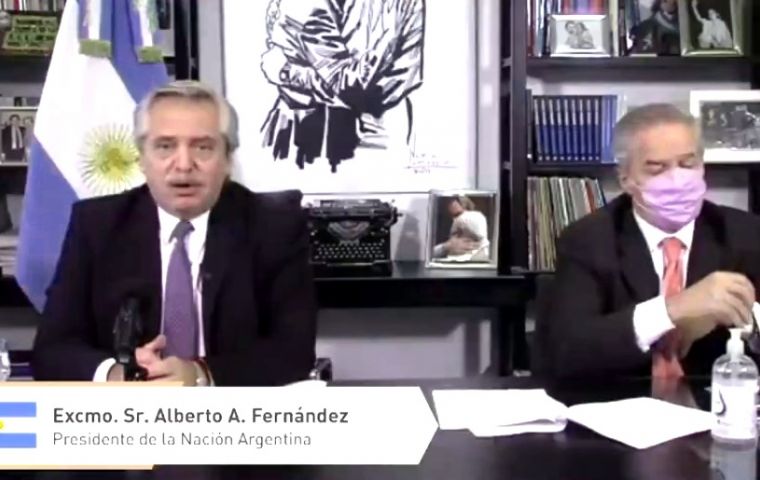MercoPress. South Atlantic News Agency
Argentine President calls for international treaty on pandemics to boost WHO's role
 Fernández thanked the countries in the group for their continuous support to Argentina's disposition to discuss the Falkland Island's issue with the United Kingdom.
Fernández thanked the countries in the group for their continuous support to Argentina's disposition to discuss the Falkland Island's issue with the United Kingdom. Argentine President Alberto Fernández Wednesday called all countries to ”reinforce the role of the World Health Organization (WHO)“ through ”an international treaty on pandemics.”
During his video appearance at the Ibero-American Summit held in Andorra with almost no leader other than those in the area on the sport, Fernández also insisted that “the vaccines have not been distributed fairly” and thanked the countries in the group for their continuous support to Argentina's effort on international forums to resume talks with the United Kingdom to find a prompt solution to the question of the sovereignty of the Falkland Islands, South Georgia Islands, and the South Sandwich Islands and the adjacent maritime spaces.
Thirteen of the nineteen Latin American leaders participated in the plenary, which began with a minute of silence for the victims of COVID-19. The presidents of Brazil, El Salvador, Mexico, Nicaragua, Paraguay and Venezuela were excused.
“We have to be able to design a true international treaty on pandemics that complements the current health regulations and reinforces the role of the World Health Organization,” Fernández said in his appearance, flanked by Foreign Minister Felipe Solá.
Fernández quoted former Argentine President Juan Domingo Perón who had announced that the future would “find us 'united or dominated'.”
“United by solidarity or dominated by fear. United by social justice or dominated by greed,” Fernández stressed.
“Our region can agree when it comes to dreaming a different future together. Multilateral coalitions and not the efforts of lone wolves are the way out of this crisis,” he added.
“From Argentina, we assume the challenge of rebuilding ourselves better and making this crisis an opportunity to work together to build a series of consensuses. It is not the time for failed recipes or to travel paths that lead to more of the same,” he went on.
But he warned that “the auspicious results of the global scientific community have not been equitably distributed” and that the “universal distribution of the vaccine plays a key role in post-pandemic recovery.”
Fernández insisted that although valuable, the Covax initiative “is clearly insufficient, and must be strengthened to overcome the difficulties encountered in obtaining vaccines from developing middle and low-income countries.”
He then suggested, “the World Trade Organization has to work on a system that, recognizing patents, actively promotes a licensing system that guarantees the global supply of vaccines and does so based on a production chain that maximizes the planet's production capacity and integrates it effectively to achieve global immunity and a system of control of future pandemics ”.
Fernández also mentioned that “middle-income countries should be considered a priority when allocating financial resources. A recovery that does not include emerging and middle-income countries does not deserve to be called a recovery,” he said as he also called for a “debt relief and debt service extension initiatives be extended to highly vulnerable middle-income countries, promoting new payment horizons and more flexible rates together with a consideration of the credit risk adapted to current circumstances ”.
In particular, he asked the International Monetary Fund (IMF) to distribute the percentages of special drawing rights (SDRs) - the “IMF currency” - that correspond to the core countries among the low- and middle-income member nations, such as Argentina, in the framework of the economic and social crisis derived from the coronavirus pandemic. He proposed to “incorporate elements of climate action” in the pact for the “transfer” of dollars.
”It is imperative to move forward with the current debate regarding their transfer (of SDRs) to developing countries, incorporating elements of climate action from beneficiary countries,“ said Fernández.
He added that ”we must move towards climate solidarity financing. The contribution of Latin America and the Caribbean in terms of climate change and biodiversity must be recognized by the international community based on strong technical and financial support. We need innovative financial mechanisms to promote development sustainable as payment plans for environmental services.“
Finally, he announced that ”we promote sustainable financing schemes for the preservation of natural assets that promote payment mechanisms for ecosystem services and the positioning of the concept of environmental debt. An exchange of debt for climate should be the mechanism capable of linking the processes of debt repayment with climate action. This is the intergenerational position that we have to be able to build.”




Top Comments
Disclaimer & comment rulesCommenting for this story is now closed.
If you have a Facebook account, become a fan and comment on our Facebook Page!